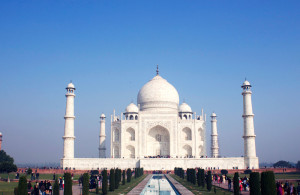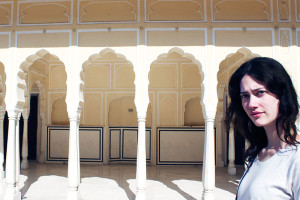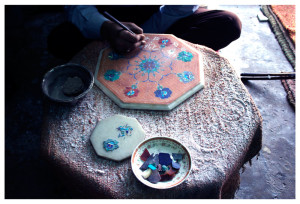 By Kate Wallace, 1/21/2015. I really expected the foreigners I met on this trip to be more interesting. Everyone always talks about all the cool people they met backpacking through country x, y or z. They had deep late night conversations about the meaning of life and their life stories and it was a life changing experience. I don’t hesitate to use the word life three times in one sentence because it is only a fraction of the amount of times the foreigners travelling through India have said it to me. And it’s because it’s what they are interested in: their own life. People talk about travelling as being this adventure where you get out of your day to day routine and find something bigger than yourself. But after sitting down with foreigner after foreigner I have found that they have transported a lot of their life to India. It looks different because it comes out of a backpack and they shave their legs less, but they haven’t really left their own world and truly immersed themselves in the culture they are living in. We often met in hippy-esque cafes filled with only white people with cushions on the floor and gluten free labels on the menu (I admit as a celiac the gluten free part was pretty sweet). They were always going to or coming from some sort of yoga thing. My Indian friend laughed at this and said everyone comes to India to do yoga, but Indian people don’t even really do yoga, “it’s really become a white person wants to lose weight thing.” This statement was confirmed when I met with two men from Sweden who over a piece of white bread and jam explained they left the yoga part to the end of the trip in case they gained any weight while travelling. They also thought it would be an enlightening experience. I’m not sure which one was more important: to experience enlightening or just simply lightening? These two men also talked about all of the amazing people they had met. There was a couple from Germany, a guy from Alabama, and another friend from Australia. I asked if they had any Indian local friends and they said they hadn’t met any yet, but new people come into the hostel all the time. I’m not sure why local Indian people would be living in a hostel, but awkwardly nodded my head and moved onto the next question. They had both quit their jobs and were travelling for 6 months to figure out what their next move was in life. They wanted to get out of their home city and be inspired. As far as I could tell a lot hasn’t changed for them except for the scenery. I wonder what the effect of having travellers like this come to India is on local Indian people other than bringing in money that wouldn’t otherwise be here.
By Kate Wallace, 1/21/2015. I really expected the foreigners I met on this trip to be more interesting. Everyone always talks about all the cool people they met backpacking through country x, y or z. They had deep late night conversations about the meaning of life and their life stories and it was a life changing experience. I don’t hesitate to use the word life three times in one sentence because it is only a fraction of the amount of times the foreigners travelling through India have said it to me. And it’s because it’s what they are interested in: their own life. People talk about travelling as being this adventure where you get out of your day to day routine and find something bigger than yourself. But after sitting down with foreigner after foreigner I have found that they have transported a lot of their life to India. It looks different because it comes out of a backpack and they shave their legs less, but they haven’t really left their own world and truly immersed themselves in the culture they are living in. We often met in hippy-esque cafes filled with only white people with cushions on the floor and gluten free labels on the menu (I admit as a celiac the gluten free part was pretty sweet). They were always going to or coming from some sort of yoga thing. My Indian friend laughed at this and said everyone comes to India to do yoga, but Indian people don’t even really do yoga, “it’s really become a white person wants to lose weight thing.” This statement was confirmed when I met with two men from Sweden who over a piece of white bread and jam explained they left the yoga part to the end of the trip in case they gained any weight while travelling. They also thought it would be an enlightening experience. I’m not sure which one was more important: to experience enlightening or just simply lightening? These two men also talked about all of the amazing people they had met. There was a couple from Germany, a guy from Alabama, and another friend from Australia. I asked if they had any Indian local friends and they said they hadn’t met any yet, but new people come into the hostel all the time. I’m not sure why local Indian people would be living in a hostel, but awkwardly nodded my head and moved onto the next question. They had both quit their jobs and were travelling for 6 months to figure out what their next move was in life. They wanted to get out of their home city and be inspired. As far as I could tell a lot hasn’t changed for them except for the scenery. I wonder what the effect of having travellers like this come to India is on local Indian people other than bringing in money that wouldn’t otherwise be here.
A boy I met here who grew up in Delhi said it has changed dramatically over the last 15 years due to increased Western influence. He doesn’t remember all the Western stores in malls and girls wearing jeans under their tunics, but since Western media influence and more Westerners have come here for work, to do business and travel the culture in India is rapidly changing. This phenomena has both negative and positive effects. He said it’s good that women are becoming more independent and families are becoming less traditional about institutions such as marriage, but can also be negative because globalization is causing a major shift to India becoming more Westernized, thus India is losing some of it’s culture that makes it unique. A girl who was present during this conversation chimed in and said “it’s funny because Westerners always come and buy the local clothes and want to look more Indian and exotic whereas Indians want to look more American.” Perhaps it’s not only the Westerners influencing Indian culture, but also the other way around. This made me think back to a conversation I had with the family I’m living with over dinner. One of the family members said globalization is a good thing because it will expose India to a different way of life and will hopefully bring some much needed social change, but also will allow Westerners to bring home some Eastern ideals that will improve their way of living. I personally can relate to this as through this trip I have discovered the value of enjoying slow meals shared with others. Growing up my family had dinner together every Sunday, but other than that a lot of meals were gobbled down on the go. And now living in New York I can’t remember the last time I sat down and had a meal without rushing through it. Although maybe a small change, taking the time to eat with others is something I have learned on my trip is very valuable and hope to continue doing when back in North America. Beyond being better for my health and digestive system, the conversations held with others over dinner can be invaluable.
I had an interesting conversation with a local Indian man who laughed when I said I mentioned part of my research involves tourism in India. He said “good, we need it.” India is not a go-to destination for young travellers like places such as Thailand would be. He said he thinks people are intimidated by the reputation of India being chaotic, dirty and dangerous. People are worried about getting sick and girls are told India isn’t safe for them. I could relate to what he was saying as it was everything I heard before I left. He thought India is pushing for more tourists to come to help the economy but some of these things would have to change here first in order to attract more foreigners. I started thinking about tripMD and how that begins to address one of the obstacles tourists face when travelling to India. In what other ways can we use design to make foreigners feel more comfortable travelling to India? And how can we use design to combat the negative effects of globalization? I notice walking through the streets here that there is garbage everywhere and no garbage cans. Creating a system that encourages people to throw out their litter benefit both Indian local people because their streets would be cleaner and would draw tourists because they would feel India was cleaner and they are less likely to get sick.
As I reflect on my last few weeks of research I think I need to look into what the effects of globalization are on the poorer people in India. I have learned about how it creates more wealth to be distributed, but who is this money reaching? How does it effect rural areas or people in slums? Is globalization creating a “the rich get richer and the poor get poorer” situation?
